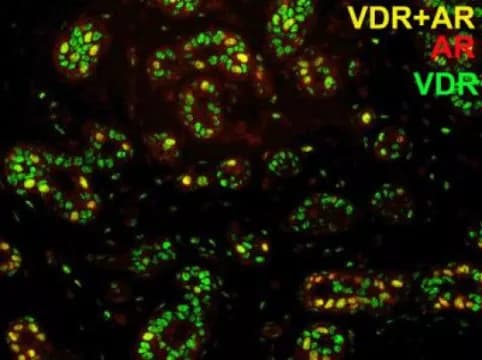
Researchers Identify Novel Treatment For Aggressive Form Of Breast Cancer
A recent study by researchers at Sylvester Comprehensive Cancer Center at the University of Miami Miller School of Medicine revealed that triple-negative breast cancer (TNBC), which has generally been unresponsive to hormone receptor-targeted treatments, can indeed be treated using vitamin D and androgen receptor-targeted therapy. The discovery offers a new treatment option beyond chemotherapy for this aggressive type of breast cancer. The study was published in the journal Breast Cancer Research and Treatment.
"The most successful treatments for breast cancer target hormone receptors; if you remove the hormone or block it, the cancer cells are less likely to survive," said Tan A. Ince, M.D., Ph.D., breast cancer pathologist at Sylvester and lead author of the study. "However, triple-negative tumors have been unresponsive to receptor-targeted treatments. It was only when we discovered that two-thirds of triple-negative breast cancers express vitamin D and androgen receptors that we were able to treat the tumors using a hormone-receptor approach."
Hormone-receptor positive vs. negative breast cancer
Breast cancers can be categorized into two subtypes -- those which are hormone-receptor positive and hormone-receptor negative. For hormone-receptor positive cancer cells, hormone-receptor therapy can be used to interrupt the role of hormones in the cells' growth and overall function. Due to the lack of receptors, this type of therapy was not an option for TNBC. Additionally, the prognosis for patients with TNBC is usually poorer than for those with other types of breast cancers.
Ince and his team found that although TNBC lacks the three receptors that fuel most breast cancers -- estrogen receptors, progesterone receptors, and human epidermal growth factor receptor 2 -- it does express androgen receptors (AR) and vitamin D receptors (VDR). This provided the basis for the study. The researchers showed that co-targeting AP and VDR with agonist hormones turned out to be an effective strategy to reduce the sustainability of the cancer cells. This could lead to the use of targeted receptor therapy in the treatment of TNBC and, in turn, to better patient outcomes.
Breast cancer stem cells
"There is growing evidence that breast cancer consists of different subtypes of cells including non-cancer stem cells and cancer stem cells," said Ince, who is also associate professor of pathology at the University of Miami Miller School of Medicine. "These stem cells possess the ability to self-renew and are thought to be associated with resistance to standard therapies as well as with metastasis. Targeting cancer stem cells may be important for complete tumor remission."
The research offers new options to treat TNBC and insights into the role of stem cells in the spread of cancer. While hormone-receptor therapy plays an important role in treating TNBC, a combined approach with chemotherapy yielded the best results.
The above post is reprinted from materials provided by University of Miami Miller School of Medicine. Note: Materials may be edited for content and length.
Disclaimer: DoveMed is not responsible for the adapted accuracy of news releases posted to DoveMed by contributing universities and institutions.
Primary Resource:
Thakkar, A., Wang, B., Picon-Ruiz, M., Buchwald, P., & Ince, T. A. (2016). Vitamin D and androgen receptor-targeted therapy for triple-negative breast cancer. Breast cancer research and treatment, 1-14.
Related Articles
Test Your Knowledge
Asked by users
Related Centers
Related Specialties
Related Physicians
Related Procedures
Related Resources
Join DoveHubs
and connect with fellow professionals

0 Comments
Please log in to post a comment.